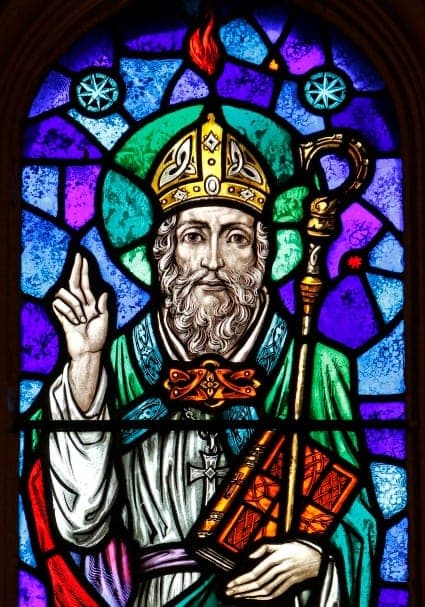The battlelines around the U.S. bishops have been drawn, with some faithful hailing their spiritual leaders’ emphasis on mercy and others lamenting an overemphasis of the rules over the joys of the Gospel.
Or, conversely, some faithful accuse their bishops of bending the Church’s principles in order to keep the people in the pews happy, while other bishops hold firm on the true meaning of Christianity despite public backlash.
Are we discussing the latest clashes over Amoris Laetitia? No, nothing as trivial as that: St. Patrick’s Day falls on a Friday of Lent this year, and the People of God want corned beef hash for dinner.
Once or twice a decade, this conundrum hits the Church. Is it possible to honor one of the country’s most beloved saints without the traditional meaty Irish meal?
Cardinal Timothy Dolan issued a statement that the people of the Archdiocese of New York are free to eat meat on St. Patrick’s Day this year.
Others, such as the Archdiocese of Denver, said the people were still obliged to abstain from meat, adding, “the Church encourages the faithful to celebrate the life of Ireland’s great saint by engaging in acts of charity, for which St. Patrick was so well known.” Which is good advice, but still sounds like your mother telling you to do your homework on prom night.
Catholic blogger Rocco Palmo keeps a scorecard of which dioceses have given the dispensation, including those who have attached conditions to their magnanimity.
And it is a scorecard, because it’s become a game, and a silly one at that.
How silly? Some of those dispensations aren’t even necessary.
In several of the dioceses where the bishop has graciously given a dispensation, the feast of St. Patrick holds the rank of a solemnity, and according to Church law, “abstinence from meat, or from some other food as determined by the Episcopal Conference, is to be observed on all Fridays, unless a solemnity should fall on a Friday.” (Canon 1251)
But still, if you go through the motions of granting a dispensation, whether you need one or not, it might get you some positive coverage in the local press.
These shenanigans would be tolerable if it were a fun game – following a set of rules almost like a liturgy – so that in those years where St. Patrick’s Day and Friday collide, the bishops would solemnly declare you could eat meat on that day. Maybe they could do it when announcing the date of Easter during the Epiphany Mass.
Instead we get a hodgepodge of contradictory rules, and people get upset because their bishop didn’t give the dispensation, or they fret that no one really cares about Lent anymore, or they just find the conditions attached to the dispensation confusing.
There is no other day on the Church calendar which causes such a fuss. No scorecards are needed for St. Stanislaus or Saint John of God, which also often fall during Lent, despite the strong devotion of segments of the population to these saints.
Saint Patrick is different. The Church in Ireland has had an outsize influence on the Church in the United States, even when taking into account the large number of Irish immigrants who came to the country. In many ways, American Catholicism grew from an Irish root, and in Ireland, St. Patrick’s Day is a solemnity and meat is allowed.
This is what the people of the United States also want, although, since they are not canon lawyers or liturgists, they would not express it in those terms. Instead, they express it by constantly asking that the day be exempt from the requirement of Friday abstinence.
Some will object that the day has become another secular feast, based on excessive drinking and partying, which is true. But the Catholic overtones are still there: The bishop blesses the St. Patrick’s Day parade in cities all over the country, and the morning Mass is usually a bit fuller than usual.
Guinness hats and ‘Kiss Me, I’m Irish’ pins might not have religious significance, but really, neither does Santa Claus nor the Easter Bunny.
For those who are aghast that Lent would be impugned, the feast of St. Joseph (19 March) and the Annunciation (25 March) are both solemnities, and when either of them fall on a Friday, there is no need to abstain from meat (although in the United States, this seems to be a secret only known to those with Italian ancestry.)
There is precedent for this sort of thing. In Australia, another country where the Irish have played an important role in the Catholic Church, St. Patrick’s Day has been a solemnity for years.
“But whether Irish or not, on 17 March the world stops to celebrate the patron saint of Ireland, and put on the green,” reads the website of the Archdiocese of Sydney, “from Sydney to Seattle and all points between, St Patrick’s Day is marked by festivals, parades and a goodly pint or two.”
The article adds “it is worth remembering that the date is also a Holy Day and that St. Patrick, Ireland’s patron Saint, deserves to be recognized in his own right, and celebrated.”
In Australia they have managed to embrace the feast, without forgetting it is a feast of the Church.
Perhaps the Church in the United States could do the same, and let the people enjoy some corn beef hash without having to check with their bishop first.














